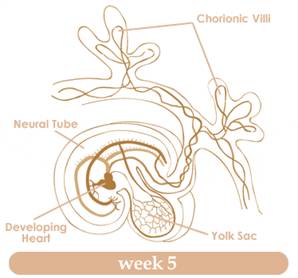Your guide to being 5 weeks pregnant
How your baby is growing
Your baby looks like a tadpole, with the ‘body’ housing the head and brain, and the ‘tail’ housing the bodily organs. Your baby is developing facial features, although they don’t look very human yet. They’ll shift into the correct position and look more recognisable later on. Two tiny nostril dents form beneath two bumps, which will develop into eyes. There’s a tiny slit, which is the first sign of the mouth, and below that a fold, which will develop into your baby’s neck. In the ‘tail’ section, your baby’s liver, kidney and appendix are growing. The heart has divided into chambers. The neural cord fuses and arm and leg buds begin to sprout.
What’s happening to you
The emotional rollercoaster continues as hormones whizz around your body. One of their vital roles now is to encourage your breasts to grow and prepare milk, so you may notice them swelling and feeling tender. Your areola (the area around the nipple) will darken so it’s easier for your baby to locate when breast feeding starts. Tiny bumps may appear. These are glands called Montgomery’s tubercles, which grow and produce oil to keep your breasts healthy and bacteria-free. Soap can interfere with these protective oils so make sure you rinse your breasts with clear water to remove traces of soap when washing.
Normal niggle:
Sore breasts, caused by the huge hormone hit they receive. Any tenderness should disappear after a few weeks. In the meantime avoid any strenuous activity which might increase soreness and wear a good-fitting bra.
When to check it out:
If your breasts enlarge early in pregnancy but then start shrinking, it could signify a drop in hormones and a problem with your pregnancy.
‘To do’ this week
Make an appointment with your GP. Your doctor will give pregnancy advice (on foods and activities to avoid) and register you for antenatal care at your local hospital. Your first antenatal (booking-in) appointment happens at about 10 weeks. Regular antenatal visits are crucial to check that your baby is developing properly and that you’re remaining healthy. If this is your first baby you should have around 10 antenatal appointments throughout your pregnancy (seven if you’ve given birth before), according to guidelines from the NHS watchdog NICE (National Institute of Clinical Excellence). Most visits happen in the second and third trimesters.






